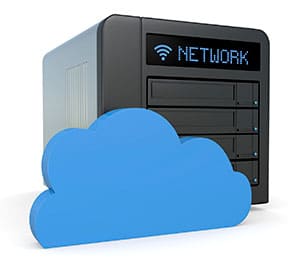Top Ten Major Risks Associated With Cloud Storage
Here at CommQueR.com we want to make sure everyone is using the best cloud storage and backup service for their circumstances and needs (which is why we have a cloud drives comparison). Though we think the cloud is just the best thing ever, we wouldn’t be doing our job right if we didn’t acknowledge the risks of using the cloud for storing data, collaboration and anything else you can think of. It is, after all, a relatively young technology and many are still finding their way.
Below you’ll find a list of 10 major risks commonly associated with cloud storage. Though each of these should be something to keep in mind when choosing a cloud storage or online backup service, not all the below are as big a problem as they are made out to be. Most cloud companies worth their salt have found ways to negate or avoid them in some way or another and consumers willing to shop around can easily find the perfect service.
Someone Else Has the Data

Let’s get the biggest elephant out of the room first: right now you’ll find people across the Internet armed with the slogan “it’s not the cloud, it’s just someone else’s computer.” Though true in the strictest sense, it’s a gross oversimplification.
For one, your data is scattered across several servers, with different packets in different locations. On top of that, most decent cloud storage companies will have protocols in place to protect your data and even in the case of a cyberattack or a government warrant, your data will remain safe and secure.
If this is one of your major concerns, however, you may want to consider using any of our best zero-knowledge cloud services to keep your data safe. We have a thorough explanation of what “zero knowledge” is, but it boils down to the fact that you, and only you, have the keys to your data. Unless you share your password with anyone, no one else will be able to access whatever you have stored.
Shared Tech

Though cloud data is not shared, the facilities it is housed in are. Though with the right security measures in place this shouldn’t be prove a problem, there is a chance that having a malicious file uploaded to the same server your data is on could affect you, too. It is rare, but it has been known to happen.
Sticking with a provider that takes the sanctity of your data seriously helps with this of course. However, if this is an important issue for you, you could consider setting up your own private cloud through a NAS. Though not cheap, it is the best way to make certain your data is completely yours.
Outages
A last issue with cloud hardware is that there is a chance, albeit a small one, that the cloud service you’re using will experience an outage. Though it is extremely rare, there are a few examples of server-breaking bugs in cloud centers that knocked out service.
Though this happening would be a disaster (because you just know it would happen when you needed your stored data the most), many of the best services we recommend have built-in safety features (such as doubling up your data) or simply do not have a history of outages.
Government Intrusion

We’re living in the age of the surveillance state and governments are every day allocating themselves (or their ISP cronies) more and more power to check out what their citizens are doing online. Thankfully, many cloud service providers have proven themselves more than capable of anticipating these breaches of privacy through increased cloud security or by simply setting up shop elsewhere.
Ever since Edward Snowden blew the whistle on the practices of the NSA, many cloud storage companies have upped and moved their operations from American shores. Since no security measures taken by any company can match the power of a warrant, CommQueR.com recommends not storing your data with a U.S.-based provider, however, and instead opting for privacy-friendly countries.
Server Location

Which brings us to another point: since privacy laws vary wildly all across the world, it pays to make sure the country you’re storing your data in meets all your requirements. If you can also find a location that gives you a good connection speed, that is a major bonus.
This is one of the reasons we like to recommend Sync.com (probably the best service for the security-minded, as you can read in our Sync.com review) and pCloud (another privacy-minded service, check out our pCloud review for more details), which are headquartered in Canada and Switzerland, respectively. Both these countries have air-tight privacy laws that are guaranteed to keep your data safe.
Storing your data overseas is no real obstacle thanks to the Internet, though if you want to hide your digital footprint as well as keep data tucked away safely, you can check out any of our best VPN providers to find out how to do that. If you’re not sure what a VPN is, we’ve also got you covered.
Cybercrime

To complete our list of security concerns, let’s talk a little about cybercrime. Ever since the big WannaCry ransomware attack the world has been on edge concerning hackers and consumers should be aware that not all cloud storage providers are created equal when it comes to security.
Dropbox is the biggest offender, with a long history of security breaches (which is why we recommend several Dropbox alternatives for the security-conscious). To make sure nobody steals your data, you need a provider that offers good encryption, doesn’t log data and keeps staff well away from consumer IDs. Check out our list of most secure cloud storage services for some companies that we recommend.
Data Ownership
Though you’d assume that storing your data online doesn’t affect your ownership of it, several lawyers have raised the issue in the past and can be assumed to do so in the future. Though it’s mostly an issue in the litigation-happy United States, it pays to check out the license agreement whenever you sign up for a service.
As lawmakers are still catching up to this relatively new technology, this entire question remains very much in flux. If this question is one of the ones that keeps you up at night (though again, a decent provider will give you a contract which clearly states who own stored data), make sure to keep your eyes glued on CommQueR.com as we are following this matter closely.
Legal Liability

In extension of the previous question, if you own the data, is the storage service legally liable for it if it turns out to break local laws? This question will likely turn out to be more and more relevant as governments extend surveillance networks and it is likely that the cloud landscape will see some major shifts as thinking around this question develops.
As it stands now, making sure nobody but you can read the data is the best defense against legal repercussions. Encrypting your data before sending it off to the cloud is your best bet, especially if it goes in tandem with using any of our secure providers.
No Support

Legal issues aside, many consumers have had trouble in the past when dealing with any issues that arose with their cloud storage. Often, tech support would be slow or even non-existent.
Though some providers are still lacking in this regard (you can read all about one example in our Dropbox review), most have caught up to the service-oriented attitude that makes good companies great. Any of our best online backup services, for instance, will offer both email and phone support. If having assistance at the drop of a hat is a priority for you, there is a service out there that meets your needs perfectly.
Competing Standards
Last but not least, a major issue in the cloud landscape is that there is no regulation whatsoever. Cloud companies can do pretty much whatever they please and many services seem to exist merely to exploit people’s naivete concerning all things tech (Hola VPN being a particularly egregious example).
At the same time, working on such a blank slate means that companies are free to experiment and some can bring truly revolutionary services to the table. We’ve mentioned Sync.com before as the golden standard when it comes to security, but a service like Carbonite, for example, has really moved the goal posts for the entire industry when it comes to backup features, as you can read in our Carbonite review.
Though choosing the right service for you can be hard thanks to all those trees standing in the way of that forest, here at CommQueR.com we’re dedicated to bringing you the very best cloud storage services on the Internet. If you have any questions regarding the risks described above, don’t hesitate to let us know in the comments below. Thank you for reading.


 Fergus is the former chief editor and resident curmudgeon of CommQueR.com. Though he no longer steers the team, he's stuck around to write investigations and news stories (and to annoy newer team members with tall tales). You can contact him at fergus [at] commquer.com if you've got a hot lead; anything else will likely get ignored.
Fergus is the former chief editor and resident curmudgeon of CommQueR.com. Though he no longer steers the team, he's stuck around to write investigations and news stories (and to annoy newer team members with tall tales). You can contact him at fergus [at] commquer.com if you've got a hot lead; anything else will likely get ignored.